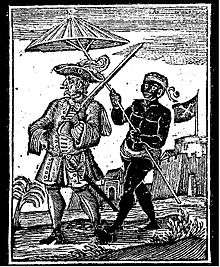Henry Avery
| Henry Avery | |
|---|---|

|
|
| Died | after 1699 Unknown, most often given as somewhere in Great Britain |
| Piratical career | |
| Nickname | Long Ben The Arch Pirate The King of Pirates |
| Allegiance | None |
| Years active | 1694–1699 |
| Rank | Captain |
| Base of operations | Atlantic Ocean, along the Pirate Round, and the Indian Ocean |
| Commands | Fancy, formerly the Charles II |
| Wealth | At least 11 vessels captured by September 1695, including the Gunsway |
Henry Avery, also Evory or Every, (baptised 23 August 1659 – after 1699), sometimes erroneously given as John Avery, was an English pirate who operated in the Atlantic and Indian oceans in the mid-1690s. He probably used several aliases throughout his career, including Benjamin Bridgeman, and was known as Long Ben to his crewmen and associates.
Dubbed "The Arch Pirate" and "The King of Pirates" by contemporaries, Avery was the most notorious pirate of his time; he earned his infamy by becoming one of the few major pirate captains to retire with his loot without being arrested or killed in battle, and also for being the perpetrator of what has been called the most profitable pirate raid in history. Although Avery's career as a pirate lasted only two years, his exploits captured the public's imagination, inspired others to take up piracy, and spawned numerous works of literature.
Avery was baptised at Newton Ferrers in Devon in England's West Country, likely a member of the local Every family; little else is known about his early life. He served in the Royal Navy from 1689 to 1690, likely participating in several battles of the Nine Years' War (1688–1697). Following his discharge from the navy, Avery began slave trading along Africa's Slave Coast. In 1693, he was again employed as a mariner, this time as first mate aboard the warship Charles II, which had been commissioned by England's ally, Charles II of Spain (the ship's namesake), to prey on French vessels in the West Indies. After leaving London in August 1693, the Charles II anchored in the northern Spanish harbor of Corunna, where other vessels were assembling for the expedition. The crew grew discontent as Madrid failed to deliver a letter of marque and the Charles II's owners failed to pay their wages. On the evening of 7 May 1694, the restless sailors mutinied. With the Charles II renamed the Fancy and Avery elected as the new captain, the Fancy sailed south en route to the Indian Ocean, soon plundering five ships off the West African coast.
...
Wikipedia
